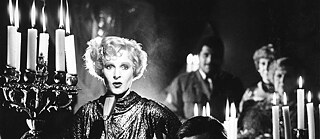Film Screening & Discussion
POSTPONED: Fassbinder, Critically Revisited: Veronika Voss (Die Sehnsucht der Veronika Voss) (1982)

CORONAVIRUS (COVID-19) UPDATE - WEDNESDAY, MARCH 11, 2020
Dear Friends,
The Goethe-Institut Washington is committed to the health and safety of our visitors and guests. Therefore, in order to reduce the risk that COVID-19 poses to our community, we have decided to postpone all programming at the Institut through March 31. We will keep everyone in our network informed with updates on our events in April.
In the meantime, please keep checking our Facebook and website at www.goethe.de/washington for updates, and follow the guidelines of the US Centers for Disease Control and Prevention (CDC), DC Health at https://dchealth.dc.gov/, Maryland Department of Health, and/or Virginia Department of Health.
Thank you very much for your patience and understanding.
Sincerely,
The Goethe-Institut Washington Program Team
--------------------------------------------------
On March 17 and March 31, join us for screenings and discussions of two Rainer Werner Fassbinder films: Veronika Voss (Die Sehnsucht der Veronika Voss) on March 17, and Whity on March 31. Each screening will be guided by an introduction and post-film conversation on Fassbinder’s representations of women and people of color onscreen.
2020 marks what would have been the 75th birthday of German filmmaker Rainer Werner Fassbinder (May 31, 1945 – June 10, 1982). A prominent figure of the New German Cinema movement in West Germany between the 1960s and 1980s, Fassbinder was a prolific director who worked in film, television, and theater.
Born in Bavaria at the end of World War II, Fassbinder grew up surrounded by the cultural, social, and political tumult of postwar West Germany. Increased United States military presence and a heavy influx of American cultural imports – an intentional effort to both „denazify“ the population and discourage the spread of communism – were prominent influences throughout Fassbinder’s early life and eventually his creative career. Later cultural and social phenomena, such as the gay rights movement and the migration waves of guest workers from Southern Europe, Northern Africa, and Turkey, also shaped themes in Fassbinder’s work.
Although he was a remarkable filmmaker, Fassbinder’s life was fraught with substance addiction, mental illness, and violence. Like some of his contemporaries, namely Werner Herzog, his personal life, relationships, and interests were closely bound with his professional life. Family, friends, and lovers came in and out of Fassbinder’s films, mirroring the offscreen relationships they shared as well. Fassbinder had one stormy relationship after another with men and women alike, sometimes leaving lovers traumatized, substance-dependent, suicidal, or even dead, in the relationship‘s wake.
As with many difficult and/or controversial male filmmakers – Roman Polanski, Woody Allen, Alfred Hitchcock, for instance – Fassbinder often placed his creative „muses“ at the fore of his films. In Fassbinder’s case, his muses were also often his lovers. Ingrid Caven, Irm Hermann, Hanna Schygulla, Eva Mattes, Margit Carstensen, Rosel Zech, and Barbara Valentin were among „Fassbinder’s women“ – often cast in roles of suffering, tragic, fallen, and otherwise tormented female characters.
Meanwhile, Fassbinder’s male muses were themselves troubled, with working-class origins and complex backgrounds. Two who appear in multiple films – Moroccan Berber actor El Hedi ben Salem and Günther Kaufmann, who was born to a Black American father and a white German mother – were nonwhite men whose roles illuminated postwar German attitudes toward racial „otherness.“ In the process, however, Fassbinder’s own personal attitudes toward this topic were also revealed.
In screening Veronika Voss, we will critically examine an example of women as portrayed by Fassbinder onscreen. Similarly, in Whity, we will critically engage with Fassbinder’s attempts to use film as a medium for joining racial discourse. But we will also consider what these portrayals of women and people of color may reveal about the man behind the films.
VERONIKA VOSS (DIE SEHNSUCHT DER VERONIKA VOSS)
Federal Republic of Germany, 1982, 104 min., Director: Rainer Werner Fassbinder, Screenplay: Rainer Werner Fassbinder, Pea Fröhlich, and Peter Märthesheimer
Munich, 1955: former UFA film star Veronika Voss, rumored to have slept with Nazi propaganda minister Joseph Goebbels, has hit a low point in her career. Unable to land roles, unstable, and desperate, Veronika meets a sports journalist named Robert Krohn. Each is drawn to the other – Veronika to Robert because he is initially unaware of her past fame, Robert to Veronika because of her alluring mystique. Their relationship depeens, and Robert decides to feature Veronika in a film about aging movie stars and fading popularity. But Robert is married, and Veronika is hiding a secret that is bound to destroy her.
RSVP
Details
Goethe-Institut Washington @ The Liz
1377 R St. NW, Ste. 300
Washington, DC 20009
USA
Language: German with English subtitles
Price: Free Admission
+1 (202) 847-4700 info-washington@goethe.de